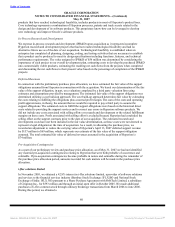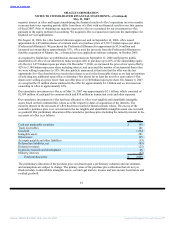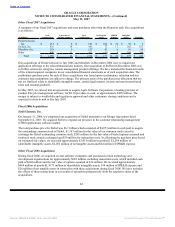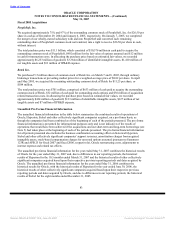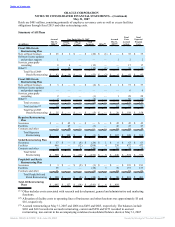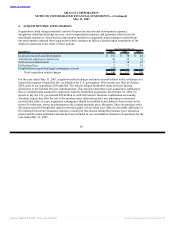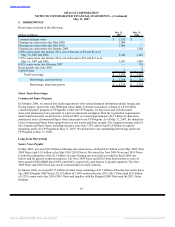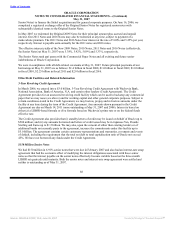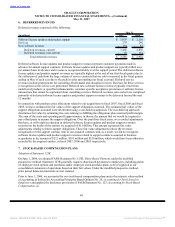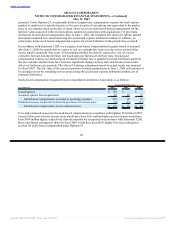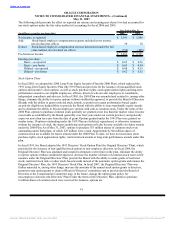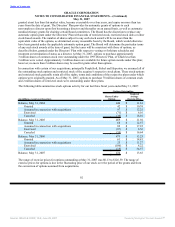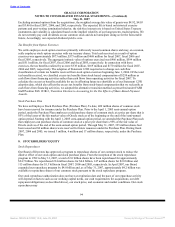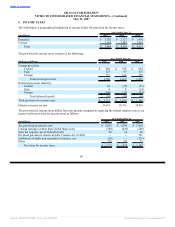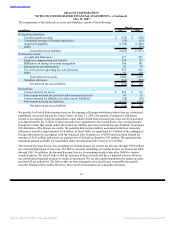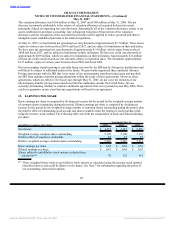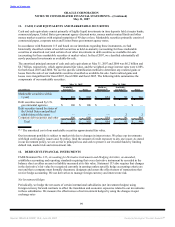Oracle 2006 Annual Report Download - page 96
Download and view the complete annual report
Please find page 96 of the 2006 Oracle annual report below. You can navigate through the pages in the report by either clicking on the pages listed below, or by using the keyword search tool below to find specific information within the annual report.
Table of Contents
ORACLE CORPORATION
NOTES TO CONSOLIDATED FINANCIAL STATEMENTS—(Continued)
May 31, 2007
6. DEFERRED REVENUES
Deferred revenues consisted of the following:
May 31,
(in millions) 2007 2006
Software license updates and product support $ 3,079 $ 2,501
Services 279 246
New software licenses 134 83
Deferred revenues, current 3,492 2,830
Deferred revenues, non-current 93 114
Total deferred revenues $ 3,585 $ 2,944
Deferred software license updates and product support revenues represent customer payments made in
advance for annual support contracts. Software license updates and product support are typically billed on a
per annum basis in advance and revenue is recognized ratably over the support period. The deferred software
license updates and product support revenues are typically highest at the end of our first fiscal quarter due to
the collection of cash from the large volume of service contracts that are sold or renewed in the fiscal quarter
ending in May of each year due to the peak in sales surrounding our fiscal year-end. Deferred service
revenues include prepayments for consulting, On Demand and education services. Revenue for these services
is recognized as the services are performed. Deferred new software license revenues typically result from
undelivered products or specified enhancements, customer specific acceptance provisions or software license
transactions that cannot be segmented from consulting services. Deferred revenues, non-current are comprised
primarily of deferred software license updates and product support revenues to be delivered beyond the next
12 months.
In connection with purchase price allocations related to our acquisitions in fiscal 2007, fiscal 2006 and fiscal
2005, we have estimated the fair values of the support obligations assumed. The estimated fair values of the
support obligations assumed were determined using a cost-build up approach. The cost-build up approach
determines fair value by estimating the costs relating to fulfilling the obligations plus a normal profit margin.
The sum of the costs and operating profit approximates, in theory, the amount that we would be required to
pay a third party to assume the support obligations. Over the past three fiscal years, we recorded adjustments
that have, or will result in reduction in deferred software license updates and product support revenues
recorded on the books of the entities we acquired of $1.0 billion. This amount represents fair value
adjustments relating to future support obligations. These fair value adjustments reduce the revenues
recognized over the support contract term of our acquired contracts and, as a result, we did not recognize
software license updates and product support revenues related to support contracts assumed in business
acquisitions in the amount of $212 million, $391 million and $320 million, which would have been otherwise
recorded by the acquired entities, in fiscal 2007, 2006 and 2005 respectively.
7. STOCK-BASED COMPENSATION PLANS
Adoption of Statement 123R
On June 1, 2006, we adopted FASB Statement No. 123R, Share-Based Payment, under the modified
prospective method. Statement 123R generally requires share-based payments to employees, including grants
of employee stock options and purchases under employee stock purchase plans, to be recognized in our
consolidated statements of operations based on their fair values. Under the modified prospective method,
prior period financial statements are not restated.
Prior to June 1, 2006, we accounted for our stock-based compensation plans under the intrinsic value method
of accounting as defined by Accounting Principles Board Opinion No. 25, Accounting for Stock Issued to
Employees and applied the disclosure provisions of FASB Statement No. 123, Accounting for Stock-Based
Compensation, as
89
Source: ORACLE CORP, 10-K, June 29, 2007 Powered by Morningstar® Document Research℠


